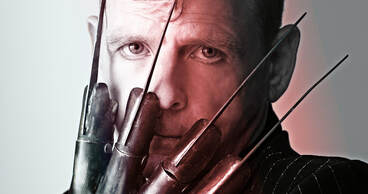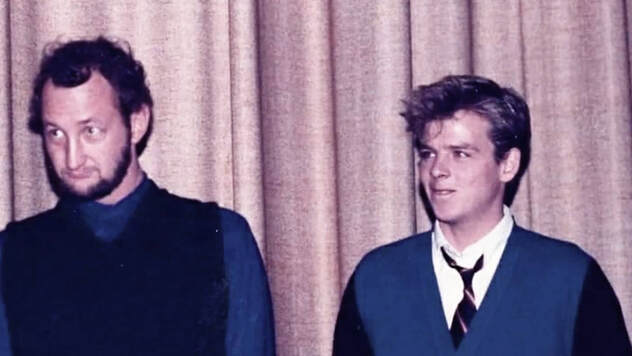 I think I was in sixth grade the first time I saw my science teacher, Mrs. Glidden, in a grocery store while out shopping with my mom. When I spotted her “in the wild,” I gasped loud enough that it got her attention. Upon hearing this and seeing me, Mrs. Glidden walked over, smiled, and said ‘Hi’ in her normal, cheerful way. Still in shock from seeing her outside of school, I said the first thing that came to mind: “You eat, too?”… …My belief, while flawed, was that teachers never left school. So naturally, when I saw one outside of school, it forced me to challenge that assumption. I think the same can be said for actors. It’s easy to forget they’re people. It’s too easy to forget they’re human beings, complete with emotions, needs, passions—a desire to eat—and like the rest of us, imperfect. Here’s the thing: we put these people on pedestals and in doing so, we forget they’re human. We tend to hold them to higher standards than we hold ourselves. They cannot fail, or break logic, without the threat of social outrage—no matter how long ago said infraction occurred. This, of course, creates an impossible world for them to be themselves, forcing them into a mentally harmful closet of secrecy and lies. The AIDS epidemic may be behind us, but this idea of impossible expectations for our revered remains alive and well. And this is what happened with Mark Patton. In case you didn’t know, Mark Patton, who play’s Jesse in A Nightmare on Elm Street: Freddy’s Revenge, is gay. So? What’s the big deal? These days? Nothing. But 30 years ago, being gay was a very big deal. Religious outrage, public disapproval, and finally, AIDS, made it virtually impossible for anyone who was gay to be open about it. People were beaten, shunned, abused and discriminated against. Comments like “homosexuality is a sin,” “they’re not human beings,” and “fags,” littered the news and media. The “check had come due,” as Mark puts in in his documentary, Scream, Queen! My Nightmare on Elm Street, which played this past weekend at the Salem Horror Film Festival. Before watching Scream, Queen, directed by Roman Chimienti and Tyler Jensen, I had read a lot about Patton’s experience with Freddy’s Revenge. All that noise had led me to believe that Scream, Queen was a witch hunt against Freddy’s writer, David Chaskin, and his alleged script-bullying of Patton because Patton was gay. Chaskin hadn’t done himself any favors either when he stated, “There was certainly some intentional subtext, but it was intended to play homophobic rather than homoerotic… there were certain choices that were made, like casting, that pushed the subtext to a higher level and stripped away whatever subtlety there may have been.” As usual, when the external doesn’t match the internal expectation, the internet spat vitriol against Chaskin and his treating of Patton—something Patton himself was a proponent of. I’m happy to report my expectation was wrong. While Chaskin is involved, he takes a back seat to the real challenge Mark endured, which is being gay in America during a time when it was not accepted and the devastating tolls it cost. In fact, as Patton states in the documentary, his anger and grief had become focused on a sole individual, rather than the real problem and circumstances surrounding it. Instead of vapid hate toward an admittedly mischievous writer, what I found was a very moving documentary about Mark and his experiences as a gay actor in Hollywood, ending on a high note, with a sit down between himself and David that, while notably uncomfortable, gives Mark some closure in the form of an apology from David. However, I’m left wondering how much “closure” David’s apology truly holds for Mark. After watching this documentary, and giving it some thought, I don’t believe David was Mark’s issue, but merely a physical representation that Mark could project his hurt upon—something physical he could “control.” In the end, I believe Mark’s hurt stems from the abuse of a society which refused to understand what it meant to be gay, something that only time and acceptance, and perhaps David’s apology, will help him heal. Anyway, I had a thought that kept nagging me while watching Scream, Queen. Despite the controversy surrounding whether Chaskin was writing Jesse’s character in a homophobic way to try and out Patton, I couldn’t help but wonder… Is Chaskin a genius? Freddy’s Revenge released in 1985, during the rise of the AIDS epidemic and when being gay—despite the sheer number of people who were—was something toxic and shameful, best left in the closet. Without an outlet, a real-life monster grew in the form of suicide for those believing they had no way out. Had Chaskin, knowingly or not, written a covert commentary on society’s outrage on homosexuality? Had he, in effect, been in support of Patton, rather than the enemy, hiding this fact through homophobic scenes? Had Mark, in his fear, gotten it wrong? In the documentary, Robert Englund (Freddy Krueger), talks about Freddy’s homoerotic interactions with Jesse as intentional. Which begs the question, was Freddy the incarnation of Jesse’s shame of being gay? Was this a subtle warning of what repressed shame means to society as a whole? Perhaps this is something that is already known and I’m just late to the game, but regardless, I found it to be a high concept and I liked it. I like thinking creative people aren’t outwardly mean, but this could just be another assumption of mine that’ll end up challenged. Regardless, Scream, Queen! My Nightmare on Elm Street is an absolute must-watch for anyone who has ever looked to a movie star and believed that it’s all glitter and gold. It is an insight into Freddy’s Revenge, yes, but more importantly, it shines a light on what it’s like to be human. It affected me and it will affect you, too. By Daniel Boucher
0 Comments
Leave a Reply. |
Archives
March 2023
|


 RSS Feed
RSS Feed